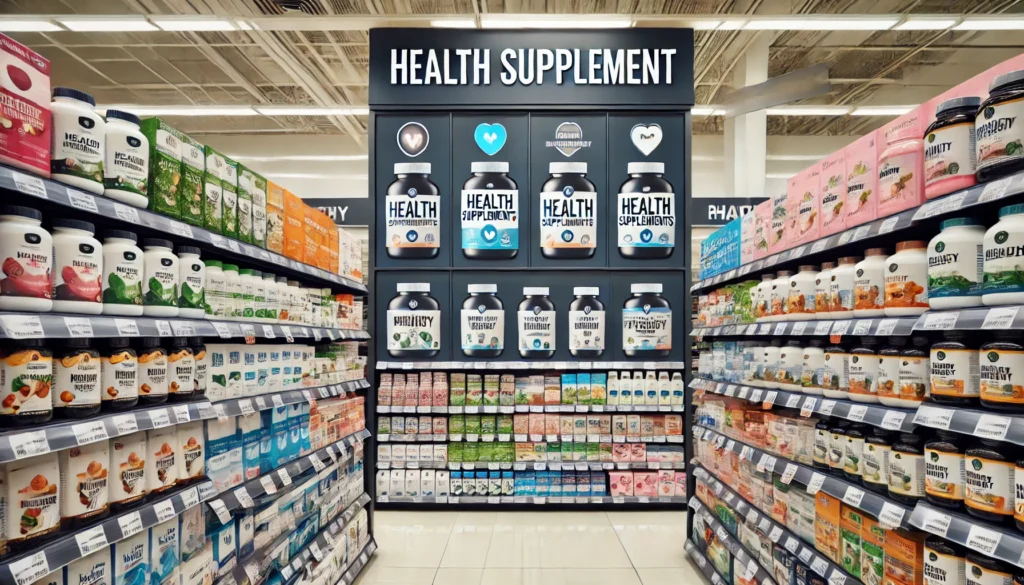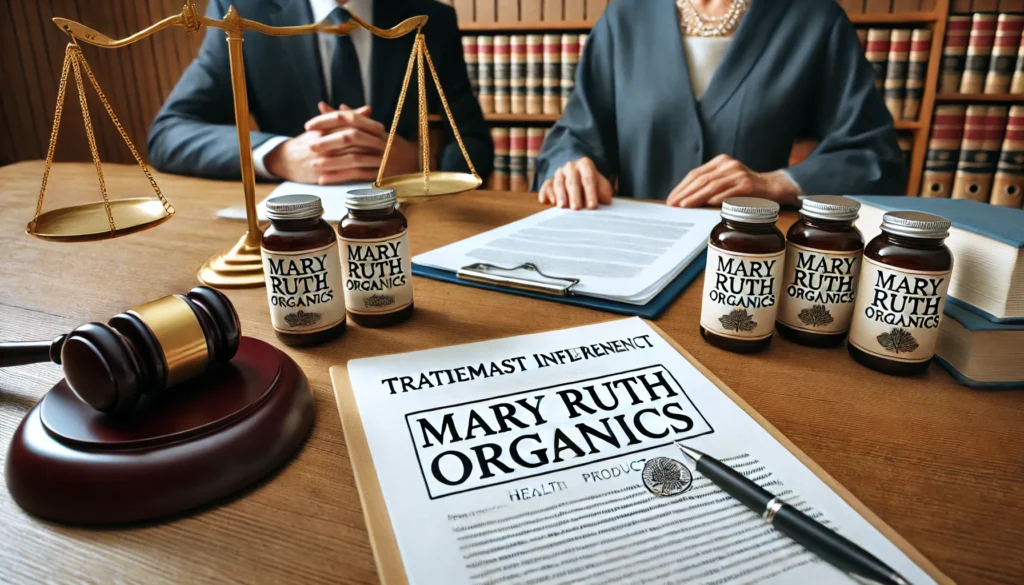Mary Ruth Organics Lawsuit is a well-established name in the world of health supplements, offering a wide range of products like vitamins, minerals, and other wellness-focused items. The brand has grown in popularity, especially among consumers looking for organic and plant-based alternatives. However, despite its success, the company has faced several legal challenges over the years.
These include lawsuits related to trademark disputes, product safety concerns, and accusations of misleading advertising. Each of these issues highlights key challenges in the health and wellness industry and serves as an important learning experience for both the company and the industry at large. This article will delve into the legal troubles that Mary Ruth Organics has faced, explaining the nature of each case and its broader implications.
Mary Ruth Organics Lawsuit: Understanding the Key Legal Challenges
Mary Ruth Organics Lawsuit, a popular health supplement company, has faced several lawsuits in recent years, each highlighting different challenges in the wellness industry. One of the most notable cases involved trademark infringement in 2022, where the company claimed that a competitor’s product packaging was too similar to theirs, potentially confusing consumers. Although the case was dismissed, it underscored the importance of protecting intellectual property in a competitive market.
In 2021, the company issued a voluntary recall for liquid probiotics for infants due to potential contamination with harmful bacteria. While no illnesses were reported, the incident raised concerns about product safety and reinforced the need for strict quality control measures.
In 2024, Mary Ruth Organics faced allegations of false advertising, with claims that some of their products made unverified health promises and had misleading labels. This highlighted the importance of ensuring transparency and accuracy in marketing, especially in an industry where consumer trust is vital.
Each of these legal challenges not only impacted the company but also served as lessons for other businesses in the supplement sector about the need for ethical practices, regulatory compliance, and a strong commitment to consumer safety.
Overview of Legal Challenges
Trademark Infringement (2022)
In 2022, Mary Ruth Organics became involved in a trademark infringement lawsuit against Doctor Danielle LLC, a competitor in the health supplement industry. The lawsuit revolved around allegations that Doctor Danielle’s product packaging closely resembled Mary Ruth Organics’ packaging. Mary Ruth Organics claimed that the design of Doctor Danielle’s products could confuse consumers, potentially leading them to mistake one product for the other.
Doctor Danielle LLC responded by defending their packaging design, asserting that it was unique and not intended to mimic Mary Ruth Organics’ branding. The case was ultimately dismissed in August 2022, suggesting that both companies may have reached a settlement outside of court. The lawsuit draws attention to the importance of protecting intellectual property in the business world, particularly in an industry like health and wellness, where strong branding is key to standing out from the competition.
The case also illustrates how companies need to be cautious when designing product packaging. Even subtle similarities in logos, color schemes, or font choices can lead to legal disputes and affect a brand’s public image.
Product Recall (2021)
In 2021, Mary Ruth Organics faced a significant setback when it had to voluntarily recall two lots of its liquid probiotics for infants. The recall was prompted by concerns about potential contamination with Pseudomonas aeruginosa, a bacterium that can cause infections, particularly in people with weakened immune systems. While no reports of illness were linked to the products, the recall was carried out as a precautionary measure to protect consumers.
The recall raised questions about the company’s safety standards and product testing practices. Although Mary Ruth Organics acted quickly to remove the potentially contaminated products from the market, the incident highlighted the challenges companies face in ensuring the safety of their products. It also put the company under public scrutiny, with consumers expressing concern over the quality control measures in place.
In response, Mary Ruth Organics worked to reinforce its commitment to product safety and implemented stricter safety protocols. The recall served as a reminder that, in the health supplement industry, it is essential to have robust procedures to detect and address potential contamination or safety risks.
False Advertising Allegations (2024)
In 2024, Mary Ruth Organics faced a new set of legal challenges in the form of false advertising allegations. The company was accused of making misleading health claims about some of its products, such as overstating the benefits of certain vitamins or supplements without adequate scientific evidence to back those claims. Furthermore, the lawsuit alleged that some of the product labels were misleading, particularly in terms of the ingredients listed.
These allegations are particularly serious because they involve consumer trust and the ethical responsibility companies have when making claims about their products. Mary Ruth Organics defended itself by stating that the claims were based on customer feedback and that the natural ingredients used in the products provided various health benefits. The company also asserted that it aimed to offer products that align with the needs and well-being of its customers.
Despite the defense, the case brought attention to the importance of ensuring that marketing and advertising strategies are truthful and substantiated. In the wellness industry, consumers rely heavily on the claims made by brands about the effectiveness of their products, so it’s critical for companies to back these claims with verifiable evidence.
Legal and Ethical Implications
For Mary Ruth Organics
The legal challenges faced by Mary Ruth Organics have had significant consequences for the company. First, the lawsuits have damaged the brand’s reputation, particularly with regard to consumer trust. Trust is one of the most important aspects of any health-related brand, and legal battles involving product safety or misleading claims can erode that trust quickly. Consumers are less likely to purchase from a company if they believe that the products may not be safe or that the company is making unsubstantiated claims about the benefits of its products.
Additionally, the financial impact of these lawsuits cannot be ignored. Legal battles, particularly those involving recalls or potential settlements, can be costly. These costs include legal fees, compensation to affected customers, and the financial loss associated with damaged brand reputation. As a result, Mary Ruth Organics has likely experienced both short-term financial stress and long-term brand challenges due to these issues.
The legal disputes also highlight the importance of complying with regulatory standards. The health and wellness industry is highly regulated, and companies are required to meet specific safety and labeling standards. Failing to comply with these regulations can lead to legal trouble, as seen in the case of the 2021 product recall.
For the Industry
The lawsuits faced by Mary Ruth Organics have broader implications for the entire health supplement industry. As the industry continues to grow, so does the scrutiny on companies that make health-related claims about their products. The rise of consumer awareness and demand for transparency means that companies must be particularly careful in how they market and sell their products.
The increased regulation of health supplements is likely to continue as authorities like the FDA and FTC tighten their enforcement of rules around labeling and advertising. These legal challenges emphasize the importance of complying with these regulations, which are designed to protect consumers and maintain the integrity of the industry.
Furthermore, as consumer concerns about product safety and ingredient transparency grow, companies will need to prioritize ethical practices in both their marketing and production. The lawsuits faced by Mary Ruth Organics illustrate the risks of over-promising product benefits or failing to meet safety standards.
Lessons Learned
The lawsuits and controversies surrounding Mary Ruth Organics offer several key lessons for companies in the health and wellness space:
Importance of Intellectual Property Protection
Ensuring that your brand’s logo, packaging, and overall design are unique is essential to avoid legal disputes. Trademark infringement cases can be costly and can cause lasting damage to a company’s reputation.
Proactive Product Testing and Quality Control
Product recalls can harm a brand’s image, but they can be avoided with proper testing and safety protocols. Companies must be diligent in maintaining high product safety standards to prevent contamination or safety issues that could lead to recalls.
Transparency in Marketing
Companies should be cautious when making health claims, ensuring that all advertising is truthful and supported by evidence. False advertising can lead to legal action, consumer mistrust, and long-term damage to a brand’s credibility.
Compliance with Regulations
Adhering to industry regulations, such as those established by the FDA and FTC, is crucial. Companies must stay up-to-date with changes in regulations and ensure their products meet all safety and labeling standards.
Conclusion
Mary Ruth Organics Lawsuit’ legal challenges, including trademark disputes, product recalls, and allegations of false advertising, highlight some of the key issues faced by companies in the health and wellness industry. While these legal troubles have certainly impacted the company, they also serve as a cautionary tale for other businesses.
In an industry where trust and transparency are critical, it is essential for companies to prioritize product safety, ethical marketing, and regulatory compliance. The lessons learned from these lawsuits will likely shape the future practices of Mary Ruth Organics and the broader supplement industry, pushing companies to be more accountable and consumer-focused. As the wellness industry continues to evolve, businesses must adapt to ensure they meet the highest standards of quality, safety, and transparency.
FAQs
What was the main issue in the 2022 trademark infringement case?
The lawsuit alleged that Doctor Danielle’s product packaging closely resembled Mary Ruth Organics’, potentially confusing consumers.
Why did Mary Ruth Organics recall liquid probiotics in 2021?
The recall was due to potential contamination with Pseudomonas aeruginosa, a bacterium that could cause infections.
What were the false advertising allegations in 2024?
Mary Ruth Organics was accused of making unverified health claims and mislabeling ingredients in some of its products.
How did Mary Ruth Organics respond to the lawsuits?
The company defended its practices, reinforced safety measures, and emphasized customer feedback and ingredient transparency.
What lessons can other companies learn from these lawsuits?
Prioritize product safety, ensure truthful marketing, and comply strictly with industry regulations to avoid similar challenges.
Article Recommendations
Armaid Complaint Sony Beverly Slate Lawsuit: Analyzing the Role of Hedge Funds in Hollywood Disputes
Navigating Personal Injury Settlements: Strategies for Maximizing Compensation




